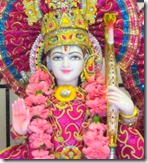 “Tulsi emphatically says, ‘O mind, hear what I am saying and always take it to heart, for this will benefit you. Remembering Shri Rama’s holy name is the greatest profit, and forgetting Him is the worst loss.’” (Dohavali, 21) “Tulsi emphatically says, ‘O mind, hear what I am saying and always take it to heart, for this will benefit you. Remembering Shri Rama’s holy name is the greatest profit, and forgetting Him is the worst loss.’” (Dohavali, 21)tulasī haṭhi haṭhi kahata nita cita suni hita kari māni | lābha rāma sumirana baḍo baḍī bisāreṃ hāni || The mind is always operating, carrying the living being in every which direction. Even when falling asleep, a time which is viewed as being free of anxiety and not requiring any effort, the mind’s processing operations actually increase in frequencey. As soon as the thoughts start rapidly flying from one point of interest to another, the tired individual falls into a sleeping state. While awake, the desires borne of the sparkling mind can result in forgetfulness of key principles and objectives. Therefore the daily routine is crafted and followed, providing a way to ensure that tasks which are assigned a “beneficial” status during periods of sober thought can be completed, irrespective of the dictates of the senses. In addition to the routine, there are the quick slogans, short sayings that the individual can repeat to remember a specific principle to live by. In the above referenced verse from the Dohavali, the rule so emphatically stressed by Goswami Tulsidas is really the only one that need be remembered, for it covers all the vital aspects of life, such asreligion, gain, profit and future fortune. The first truth presented by Tulsidas is the real crux of the rule, as it automatically creates the second condition. 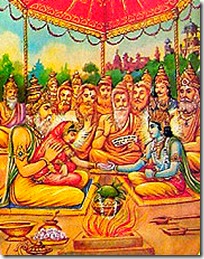 Who in this life hasn’t been subjected to heartache and despair arising from defeat and loss? Surely in the past we have suffered greatly and thought that we had lost everything only to realize later on that the setback wasn’t all that bad. The most acute pains arising from loss are felt in the arena of romantic love, or the relationships between men and women. In ancient Vedic times, marriages were arranged by parents, so the boy and girl would not speak with each other until after they were married. The human form of life represents the greatest opportunity for release from the cycle of birth and death. The basic principle of Vedic teachings is that “you get what you want.” If you want to live in the Supreme Being’s company, you are granted His audience. Otherwise you can remain in a separated land perpetually, life after life, until your desires change. Who in this life hasn’t been subjected to heartache and despair arising from defeat and loss? Surely in the past we have suffered greatly and thought that we had lost everything only to realize later on that the setback wasn’t all that bad. The most acute pains arising from loss are felt in the arena of romantic love, or the relationships between men and women. In ancient Vedic times, marriages were arranged by parents, so the boy and girl would not speak with each other until after they were married. The human form of life represents the greatest opportunity for release from the cycle of birth and death. The basic principle of Vedic teachings is that “you get what you want.” If you want to live in the Supreme Being’s company, you are granted His audience. Otherwise you can remain in a separated land perpetually, life after life, until your desires change.For every living entity, who is a combination of spirit soul and an outer covering composed of varying proportions of material elements, the desire for sex life is the most difficult sense urge to control, which in turn serves as the strongest impediment towards spiritual awakening. Therefore it is not surprising that Vedic teachings would try to attack this urge from the very beginning of life. The child gets a head start because they have no inclination towards sexual activity until they hit puberty. The downside is that the child also lacks intelligence and maturity. Therefore if proper training can be imparted, along with restrictions on behavior, during the early years of life, much progress can be made towards meeting the final objective of being God conscious at the time of death. According to the information presented in the Bhagavad-gita, the Song of God and universally applicable treatise on spirituality spoken by Lord Krishna, the Supreme Personality of Godhead, one who has his mind fixed on the transcendental form of the Supreme Lord at the time of death never has to return to samsara, or the material life fueled by the transmigration of the soul, orreincarnation.
 If there isn’t a marriage arrangement made, the sexual urges of even the children brought up in a life of celibacy and austerity can take over the mind. If the sexually inclined youth can be married to a chaste and pious woman, then there is every opportunity for continuing the march towards eternal freedom that is a permanent God consciousness. Therefore in times past the marriages were arranged for young children through family tradition, with the astrological charts of the prospective bride and groom compared to see if they were compatible. Even with all the changes brought on by material advancement and the onset of the Kali Yuga, the age we currently live in, the arranged marriage is still somewhat followed in the Vedic tradition. If there isn’t a marriage arrangement made, the sexual urges of even the children brought up in a life of celibacy and austerity can take over the mind. If the sexually inclined youth can be married to a chaste and pious woman, then there is every opportunity for continuing the march towards eternal freedom that is a permanent God consciousness. Therefore in times past the marriages were arranged for young children through family tradition, with the astrological charts of the prospective bride and groom compared to see if they were compatible. Even with all the changes brought on by material advancement and the onset of the Kali Yuga, the age we currently live in, the arranged marriage is still somewhat followed in the Vedic tradition.But there are some wrinkles to the modern incarnation of the system. The boy and girl considering marriage are typically much older now. Since the rural lifestyle is almost nonexistent today, a bride’s family looks for a groom who has a steady job, which typically comes about later on in life. In addition, the boy and girl often talk to each other before the marriage arrangement is finalized. With this method there is every chance of an attachment being formed before there is ever any deal agreed to. In fact, it is completely likely that one of the parties can think that the deal is in the bag, that they are all set to get married, only to have the rug swept from underneath them at the last minute. Being left at the altar, losing out in a marriage arrangement, or failing at the last moment, when you thought you were on the precipice of victory, can cause tremendous pain. The discomfort felt from loss only increases when the object missed out on is considered high in value. Missing out on a life partner in a spouse seems like the greatest loss; therefore romantic dealings tend to bring the most heartache. The same principle applies to losing a job, a friend or family member, or a lot of money through a bad investment. 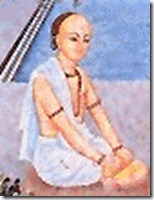 When considering the bigger picture, however, it is understood that the greatest loss can only relate to the fortunes of the soul. In this context, Goswami Tulsidas, a celebrated poet of the Vedic tradition, has an opinion that is completely different from the prevailing viewpoint on loss and gain. Indeed, he himself was greatly attached to his wife in his early life. The kind-hearted souls who are God conscious from the beginning of their lives have tremendous love and affection for every person in the world. This would make sense, as the devotee of the Lord understands that all life forms, including the animals, are God’s sons and daughters. Therefore, surveying every situation with a purified vision, the sincere soul sees every person as their close friend, for everyone is spiritually equal and eligible for returning to the spiritual kingdom. When considering the bigger picture, however, it is understood that the greatest loss can only relate to the fortunes of the soul. In this context, Goswami Tulsidas, a celebrated poet of the Vedic tradition, has an opinion that is completely different from the prevailing viewpoint on loss and gain. Indeed, he himself was greatly attached to his wife in his early life. The kind-hearted souls who are God conscious from the beginning of their lives have tremendous love and affection for every person in the world. This would make sense, as the devotee of the Lord understands that all life forms, including the animals, are God’s sons and daughters. Therefore, surveying every situation with a purified vision, the sincere soul sees every person as their close friend, for everyone is spiritually equal and eligible for returning to the spiritual kingdom.Tulsidas was so attached to his wife that he didn’t like it when she would leave home. In the arranged marriage system, the new bride misses her family home very much, for after marriage she must live exclusively with her husband and his family. Therefore it is not uncommon for the wife to desire to visit her family home from time to time. Indeed, Sita Devi, the wife ofLord Rama - a warrior prince incarnation of the Supreme Lord - once referenced this very fact while presenting a series of arguments in favor of her accompanying her husband on a fourteen year journey through the forest.
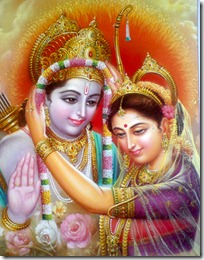 Shri Rama, through a series of unfortunate events, was asked to leave His kingdom of Ayodhya on the very day He was to be installed as the new king succeeding His father, Maharaja Dasharatha. Just like a man left at the altar, Rama was a kind soul who had seemingly lost the opportunity for material wealth and opulence. But one of the qualities of the Supreme Spirit is that He is the most renounced; therefore nothing can phase Him. Losing out on the kingdom did not bother Rama at all, for He was thrilled at the opportunity to prove His father’s truthfulness at a time when it was in doubt. Dasharatha had promised his youngest wife Kaikeyi any two boons of her choosing. Taking the opportunity of Rama’s installation to test out her husband’s commitment to his word, Kaikeyi asked that her son, Bharata, who was also Rama’s younger brother, be installed as the new king instead. For her second boon she put the dagger into Dasharatha’s heart by demanding that Rama be banished from the kingdom for fourteen years. Shri Rama, through a series of unfortunate events, was asked to leave His kingdom of Ayodhya on the very day He was to be installed as the new king succeeding His father, Maharaja Dasharatha. Just like a man left at the altar, Rama was a kind soul who had seemingly lost the opportunity for material wealth and opulence. But one of the qualities of the Supreme Spirit is that He is the most renounced; therefore nothing can phase Him. Losing out on the kingdom did not bother Rama at all, for He was thrilled at the opportunity to prove His father’s truthfulness at a time when it was in doubt. Dasharatha had promised his youngest wife Kaikeyi any two boons of her choosing. Taking the opportunity of Rama’s installation to test out her husband’s commitment to his word, Kaikeyi asked that her son, Bharata, who was also Rama’s younger brother, be installed as the new king instead. For her second boon she put the dagger into Dasharatha’s heart by demanding that Rama be banished from the kingdom for fourteen years.Dasharatha especially didn’t want to accede to the second request, considering that Rama was his most beloved object. Yet Rama took the news in stride. He was all ready to go to the forest, but He had to tell His kind wife Sita about the turn of events first. He insisted that she remain in the kingdom and be protected from the dangers of forest life. She, of course, was having none of this. Being well versed in dharma, she presented a flawless case in favor of her going. She referenced all the Vedic tenets pertaining to marriage and the duties of the wife. And just in case Rama was fearful that she wouldn’t be happy living in the wilderness, devoid of the company of the royal bards and servants, Sita made sure to mention that she would feel as happy as if she were in her paternal home. This is significant because the wife in the arranged marriage feels the most comfortable in the home that she grew up in. This trait also applies to many of us, as our fondest childhood memories often occurred in our family home. But Sita accurately noted that wherever Rama was, she would be the most happy. 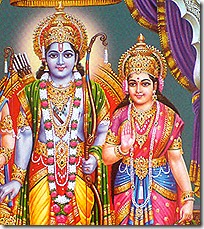 Tulsidas’ wife one time managed to sneak out of the house and make it back to her parents’ home. Seeing that his wife was gone, Tulsidas could not bear the separation. He immediately went looking for her, not being deterred by even a torrential downpour. When he finally made it to her parents’ house, Tulsidas was expecting to be greeted with kind words and praise for his dedication. Instead, his wife chastised him for being so attached to a woman. She remarked that if only he had the same attachment for his beloved Rama, he might actually be something. Tulsidas’ wife one time managed to sneak out of the house and make it back to her parents’ home. Seeing that his wife was gone, Tulsidas could not bear the separation. He immediately went looking for her, not being deterred by even a torrential downpour. When he finally made it to her parents’ house, Tulsidas was expecting to be greeted with kind words and praise for his dedication. Instead, his wife chastised him for being so attached to a woman. She remarked that if only he had the same attachment for his beloved Rama, he might actually be something.Realizing that she was right, Tulsidas immediately left family life and took to sannyasa, the renounced order. The rest was, as they say, history, for he went on to author volumes of wonderful poetry praising the Lord and His greatest devotee, ShriHanuman. Losing the wife is considered the greatest loss, especially for a husband who is very attached to her. Yet from his own experience, Tulsidas was able to realize that the greatest gain in life comes from remembering Shri Rama. The Supreme Lord is our ever well-wishing friend after all, so how can remembering Him be detrimental? Is not our constitutional makeup to be engaged in the service of that one entity from whom we all emanate? A machine is meant to perform the tasks it was built to take on, so if any other functions are undertaken, surely the results will not be palatable. Along similar lines, the spirit soul is intrinsically configured to love the Supreme Lord through every thought, word and deed. When the body parts are used to serve the senses and the illusory nature enveloping the perishable land, the constitutional position of the soul remains forgotten, and thus supreme profit remains a pipe dream. 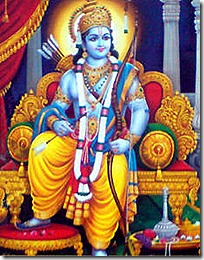 In the above referenced verse, Tulsidas emphatically begs his mind to remember just one fact. The mind will jump from one interest to another very quickly. Even if a realization is made, an epiphany if you will, the chances of forgetting the awakening thought are high. Therefore the kind poet asks his mind to just remember one thing, a key item that will be to its benefit when heard; a point of fact that should be kept within the heart, never to be misplaced. He says that remembering Shri Rama brings the greatest profit, and forgetting the Lord carries the greatest loss. Ironically enough, the first truth automatically creates the second condition. Let’s say, for example, that we have a winning lottery ticket in our drawer at home. The ticket can be exchanged for millions of dollars, which is viewed as the highest gain for he who is not spiritually conscious. Naturally, should the same ticket go missing, the ill luck would be considered the greatest loss, as the potential for the big gain of millions of dollars would vanish. In the above referenced verse, Tulsidas emphatically begs his mind to remember just one fact. The mind will jump from one interest to another very quickly. Even if a realization is made, an epiphany if you will, the chances of forgetting the awakening thought are high. Therefore the kind poet asks his mind to just remember one thing, a key item that will be to its benefit when heard; a point of fact that should be kept within the heart, never to be misplaced. He says that remembering Shri Rama brings the greatest profit, and forgetting the Lord carries the greatest loss. Ironically enough, the first truth automatically creates the second condition. Let’s say, for example, that we have a winning lottery ticket in our drawer at home. The ticket can be exchanged for millions of dollars, which is viewed as the highest gain for he who is not spiritually conscious. Naturally, should the same ticket go missing, the ill luck would be considered the greatest loss, as the potential for the big gain of millions of dollars would vanish.Similarly, remembering Shri Rama, who is the Supreme Lord Himself, brings satisfaction to the consciousness at every second. Even if we find ourselves in the most difficult of situations, by simply chanting, “Hare Krishna Hare Krishna, Krishna Krishna, Hare Hare, Hare Rama Hare Rama, Rama Rama, Hare Hare”, the mind can be delivered, for that is the very purpose of a mantra. The two Sanskrit letters in the word “mantra” refer to the mind and the delivery of it from a perilous condition. The name of Rama is the same as the person it represents. Lord Rama’s name also evokes memories of His other names, forms, pastimes and qualities. Remembering Rama means remembering Sita, Hanuman and the Lord’s dear younger brother Lakshmana, who as a faithful and sincere servant and younger brother is one of the most glorious people to have ever roamed this earth. Studying Lakshmana’s character alone is enough to become firmly convinced of the opinion that loving God is man’s only business in life. If remembering Rama can also bring memories of His extended spiritual family and their loving dedication to Him, what need do we have for anything else? All other aspects of the phenomenal world are temporary in nature, and thus they will have to be renounced at some point. What goes up must come down, therefore with every attachment there must come separation. With devotion to Rama, however, there is never a chance of being separated from Him, even if there is a seemingly significant physical distance separating the conditioned soul from the spiritual world. Some of the most blissful spiritual feelings are evoked through worship in the mood of separation, which was practiced perfectly by Sita Devi when she had to live without Rama on many occasions. Only Rama can be loved and adored equally in both personal presence and separation, with the mind keeping the transcendental link active. 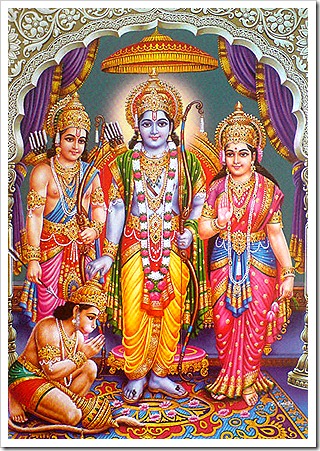 If remembering Rama leads to the greatest profit, those who forget such a benevolent Lord will automatically suffer the greatest loss. Regular remembrance of the Supreme Lord is known as bhakti-yoga, or God consciousness. This practice is not only open to everyone to employ, but it is also part of the soul’s makeup. The mission in the human form of life is summarily presented in the above mentioned prescription from Tulsidas. Even if we have suffered loss after loss and defeat after defeat, just by remembering Rama and chanting His name, our worries can be removed. The mind should be constantly reminded of this fact. Not only should we remember the Supreme Lord, but we should remember to remember Him. He whose mind swims in the holy lake of the transcendental names and activities of Shri Rama and His dear associates emerges from life’s struggles as the biggest winner, for he never again has to suffer the pangs of defeat brought on by material contact If remembering Rama leads to the greatest profit, those who forget such a benevolent Lord will automatically suffer the greatest loss. Regular remembrance of the Supreme Lord is known as bhakti-yoga, or God consciousness. This practice is not only open to everyone to employ, but it is also part of the soul’s makeup. The mission in the human form of life is summarily presented in the above mentioned prescription from Tulsidas. Even if we have suffered loss after loss and defeat after defeat, just by remembering Rama and chanting His name, our worries can be removed. The mind should be constantly reminded of this fact. Not only should we remember the Supreme Lord, but we should remember to remember Him. He whose mind swims in the holy lake of the transcendental names and activities of Shri Rama and His dear associates emerges from life’s struggles as the biggest winner, for he never again has to suffer the pangs of defeat brought on by material contact |
Search This Blog
Friday, July 15, 2011
The Biggest Winner
Subscribe to:
Post Comments (Atom)
No comments:
Post a Comment